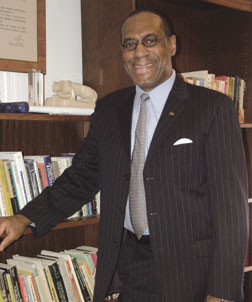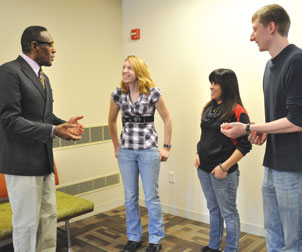Curtiss E. Porter, Penn State Greater Allegheny Chancellor, Leads Campus as It Expands Its Degree Offerings, International Scope
 Curtiss E. Porter
Curtiss E. PorterCurtiss E. Porter taps into a number of skills he’s honed throughout his career as he handles the responsibilities of his current job: chancellor of Penn State Greater Allegheny. His shaping of that position is defined, in part, by a panoply of roles and occupations he’s held throughout his life: senior administrative leader, teacher, U.S. Air Force veteran, college and graduate student, Black activist, and son, to name a few.
Prior to joining Greater Allegheny, Porter’s career placed him in various positions, including service as an instructor in Black studies at California University at Long Beach; president and CEO of the Urban League of Southwestern Connecticut; director of diversity programs for Greenwich, Conn., Country Day School; vice president for affiliate development for the National Urban League; and director of the University of Connecticut’s Stamford campus.
The Pitt alumnus (A&S ’69, EDUC ’84G) moved to Penn State Greater Allegheny in 1999, and as chancellor he oversees operations in McKeesport and White Oak.
The Penn State Greater Allegheny campus is continually evolving, and among the changes and developments that Porter has steered are:
• The initiation of four-year degree programs on the campus, including degrees in business, communication, English, information science technology, and psychology, among others;
• The building of the 27,000-square-foot, $6.25 million Student Community Center, as well as the $1.7 million refurbishing of the 2,000-square-foot Fitness and Cultural Center;
• The management of fundraising campaigns totaling $9.2 million;
• The school’s receipt of numerous grants, including $900,000 from the Pittsburgh Foundation for Greater Allegheny’s University Center for Community Engagement and Partnership and $550,000 annually from the Commonwealth of Pennsylvania for vocational education and career and training.
Porter said one of his biggest challenges is to make higher education more accessible to more people—something that has been difficult during these economic times, as public resources for higher education dwindle.
The Penn State Greater Allegheny chancellor also said he hopes to increase the number of four-year programs offered at his campus so that more graduates can make an impact on the community. The school’s STEM (science, technology, engineering, and math) summer bridge program recently received the support of EQT Corporation, which will provide funding to allow the program to continue.
Porter said he also works to connect his campus to the wider world, with the school recruiting in South America, Asia, and Africa. An agreement with Duy Tan University in Vietnam allows for that Southeast Asian institution’s faculty to be taught American classroom and business techniques.
Universities have a significant role to play within their communities, Porter said. Penn State Greater Allegheny’s University Center for Community Engagement and Partnerships, for example, recently received Heinz Foundation funding for a program to work with African American males. In addition, he said, the school teaches courses on civic and community engagement, provides a forum for ideas to be presented in a community format, and engages faculty and students in contributing to a green environment.
In addition to performing his administrative role, Porter also teaches. His course offerings at Penn State Greater Allegheny include African Americans in the 20th Century and Civic and Community Engagement.
Are today’s students different than students were when he was in school? “They are different by virtue of the crucibles that have shaped them,” Porter answered. “The social issues shaped us—segregation, discrimination, and moving from accommodation to outright challenge. For them [today’s students], the context for discrimination is subtle. They still have that youthful passion and energy and approach issues of racism as not necessary. There is not the day-to-day awareness of racism for them, and when they do encounter it, the response is, ‘This is ridiculous.’”
That world view contrasts sharply with the atmosphere and burgeoning racial tensions that were sweeping college campuses, including Pitt’s, during the late 1960s and 1970s. Porter’s college career began in 1964 on the Penn State Greater Allegheny campus, then known as Penn State McKeesport. (As chancellor, Porter would be instrumental in changing the school’s name to Penn State Greater Allegheny in 2007 to more accurately reflect the campus’ expanded mission.) He enrolled as a freshman at Penn State after serving for five years in the U.S. Air Force and then working in the H.J. Heinz Company’s data processing department.
In his junior year, Porter transferred to Pitt, where he joined the Pittsburgh campus’ Black Action Society (BAS). The BAS sought major change at Pitt by seeking to convince the administration to increase the number of African American students, staff, faculty, and administrators, as well as social, academic and community-based programming. The 1969 takeover of Pitt’s computer center, in which Porter participated, was BAS’ best-known stand. University administrators negotiated with BAS members and agreed to recruit more Black students, add additional Black administrators, and create a Department of Black Studies.
Pitt’s administration negotiated with the students and ultimately asked Porter and Jack L. Daniel, a 1969 Pitt PhD student who is now a Pitt Distinguished Service Professor of Communication, to help develop a framework for the department and its curriculum. A Black studies department was created, and Porter chaired it from 1975 to 1981. It is now the Department of Africana Studies, housed in Posvar Hall.
Porter grew up in Braddock near U.S. Steel’s Edgar Thompson works, where his father worked and where, out of the family’s home, his mother operated a bistro. He describes his mother as a “strongly independent woman who was successful for her time and status.” Porter said he learned the value of working hard from both of his parents.
“My mother’s and father’s examples were of ordered perspective and outcomes,” he added.
When asked about his accomplishments, Porter said: “When there was a time for people to stand and be counted against the blatant evils of racism and discrimination, I stood. Every outcome is in the process of standing for who we are as opposed to who we are not."
And reflecting upon his Pitt days, he noted, "The thing I cite most often is the fact that we generated the Africana Studies department. It is there. The institutional changes we fought for have become part of the institution.”
 Chancellor Porter talks with students on the Penn State Greater Allegheny campus.
Chancellor Porter talks with students on the Penn State Greater Allegheny campus.Other Stories From This Issue
On the Freedom Road

Follow a group of Pitt students on the Returning to the Roots of Civil Rights bus tour, a nine-day, 2,300-mile journey crisscrossing five states.
Day 1: The Awakening
Day 2: Deep Impressions
Day 3: Music, Montgomery, and More
Day 4: Looking Back, Looking Forward
Day 5: Learning to Remember
Day 6: The Mountaintop
Day 7: Slavery and Beyond
Day 8: Lessons to Bring Home
Day 9: Final Lessons

